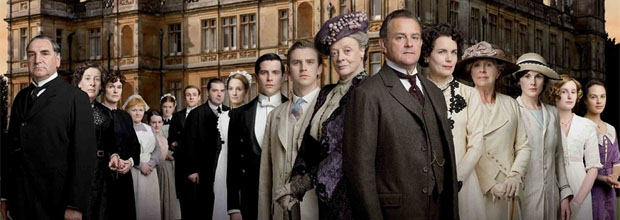
Sparkling dialogue; glorious performances; clunky plotting.
So seems to be the verdict on Series 2 of Downton Abbey, and, to be honest, we couldn’t disagree with it.
Allegations of soapiness and preposterousness have dogged this year’s series. While there may be an element of backlash to the critique – from those who have forgotten the soapier elements of Series 1 – even so, it would be wrong to dismiss the backlash as just ‘tall poppy syndrome’.
So – what went wrong with Series 2, and where should the show go from here?
Structurally, part of the problem was the curious double timeline. On the one hand, many events, such as the appearance of the burns victim heir, played out in story-of-the-week fashion, as the series raced through the years of the First World War in a way that ate up whole months, sometimes whole years, between episodes.
But at the same time, there were other storylines – most notably the romance between Sybil and Branson – which played out in closer to what passes for real time in television drama, with the sedate unfolding of the action reflecting, and seeming to mirror, the viewers’ real-time experience of watching the show in weekly instalments.
As far as the script was concerned, there was internal consistency and the timelines matched up. But for the viewer, it didn’t feel like that. It felt like there were contradictory impulses at work. So often, one was left wondering why certain events – some of them seismic – had been forgotten about from one week to the next, while other lesser storylines, such as the one about Ethel’s baby, had a life beyond what one would have anticipated to be their natural length.
In effect, if you were a character whose story progressed across several episodes, then you could show remembrance of what had gone before, even if the mechanics of the plot required you metaphorically to tread water. However, if you featured in the story of the week, then you were not guaranteed the same character development.
In another series, Edith’s encounter with the imposter heir, with whom she enjoys a shadow love that mirrors that for her sister’s late fiancé, would have profoundly changed her attitudes and behaviour, propelling her into an end-of-series storyline where her feelings of brokenness and loss would have driven the action. But it didn’t happen that way.
In fact, what is notable about Downton’s second series is how many of the viewers’ predictions as to what would happen were more radical than those which the script ultimately offered. Somewhere on the fan forums exists an alternate version of Series 2, where Matthew became hideously disfigured in the war, recognisable only by Mary’s mascot, and where Robert fathered an illegitimate son with Jane, the birth of which mocked his ability to conceive a male heir with Cora.
Such a series may not have been any less melodramatic, or indeed any better, but it would have taken greater risks. What is noticeable about writer Julian Fellowes’ approach to plotting this series, however, is ultimately how conservative it is. Boats are rocked, but only temporarily, and the ocean is soon calmed – the status quo reasserting itself as the aristocracy maintains its superiority, despite the temporary interventions of the First World War.
Now, as we look ahead to Series 3, Fellowes must risk greater losses, especially of those characters we care about most. The 1920s, in which the new series will be set, offers plenty of scope for historical upheaval, but the series will continue to invite parody if it presents historical events as brief cameos only – a reference to a Tsar here and an uprising there – rather than situations which dramatically and permanently affect the characters.
The cosy domesticity of Downton, and the comparative stability of the cast, is undoubtedly something which attracts viewers, and upper class soap will always play better than historical re-enactment.
Even so, there is potential for properly exploring the impact of history on the characters. How will the mining community in Yorkshire be affected by the General Strike of 1926? How will Sybil and Branson’s young love, so optimistic, be affected by the Civil War in Ireland? And if Lady Cora’s money is the legacy on which Downton’s current financial security is built, how will her situation, as an American, be affected by the Wall Street Crash?
Just as we want a happy ending for Mary and Matthew in Series 3, so we would like these questions explored too.
> Buy the Series 2 boxset on Amazon.
Watch the Series 2 trailer…

